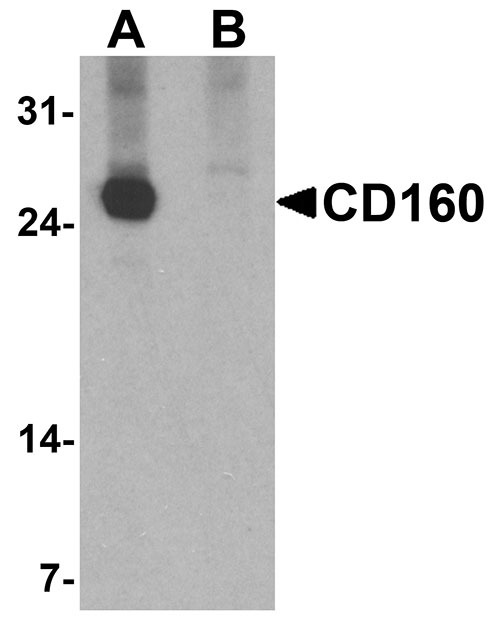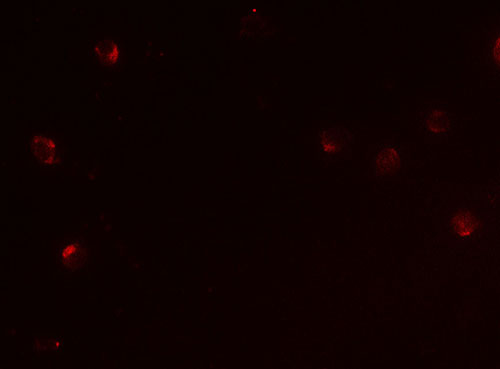CD160 Antibody
- SPECIFICATION
- CITATIONS
- PROTOCOLS
- BACKGROUND

Application
| WB, IF, E |
|---|---|
| Primary Accession | O95971 |
| Other Accession | NP_008984, 5901910 |
| Reactivity | Human, Mouse |
| Host | Rabbit |
| Clonality | Polyclonal |
| Isotype | IgG |
| Calculated MW | Predicted: 20 kDa Observed: 25kDa |
| Application Notes | CD160 antibody can be used for detection of CD160 by Western blot at 1 - 2 µg/ml. |
| Gene ID | 11126 |
|---|---|
| Target/Specificity | CD160; CD160 antibody is human and mouse reactive. Multiple isoforms of CD160 are known to exist. |
| Reconstitution & Storage | CD160 antibody can be stored at 4℃ for three months and -20℃, stable for up to one year. |
| Precautions | CD160 Antibody is for research use only and not for use in diagnostic or therapeutic procedures. |
| Name | CD160 {ECO:0000303|PubMed:16809620, ECO:0000312|HGNC:HGNC:17013} |
|---|---|
| Function | [CD160 antigen]: Receptor on immune cells capable to deliver stimulatory or inhibitory signals that regulate cell activation and differentiation. Exists as a GPI-anchored and as a transmembrane form, each likely initiating distinct signaling pathways via phosphoinositol 3-kinase in activated NK cells and via LCK and CD247/CD3 zeta chain in activated T cells (PubMed:11978774, PubMed:17307798, PubMed:19109136). Receptor for both classical and non-classical MHC class I molecules (PubMed:12486241, PubMed:9973372). In the context of acute viral infection, recognizes HLA-C and triggers NK cell cytotoxic activity, likely playing a role in anti-viral innate immune response (PubMed:12486241). On CD8+ T cells, binds HLA-A2-B2M in complex with a viral peptide and provides a costimulatory signal to activated/memory T cells (PubMed:9973372). Upon persistent antigen stimulation, such as occurs during chronic viral infection, may progressively inhibit TCR signaling in memory CD8+ T cells, contributing to T cell exhaustion (PubMed:25255144). On endothelial cells, recognizes HLA-G and controls angiogenesis in immune privileged sites (PubMed:16809620). Receptor or ligand for TNF superfamily member TNFRSF14, participating in bidirectional cell-cell contact signaling between antigen presenting cells and lymphocytes. Upon ligation of TNFRSF14, provides stimulatory signal to NK cells enhancing IFNG production and anti-tumor immune response (By similarity). On activated CD4+ T cells, interacts with TNFRSF14 and down-regulates CD28 costimulatory signaling, restricting memory and alloantigen-specific immune response (PubMed:18193050). In the context of bacterial infection, acts as a ligand for TNFRSF14 on epithelial cells, triggering the production of antimicrobial proteins and pro-inflammatory cytokines (By similarity). |
| Cellular Location | [CD160 antigen]: Cell membrane; Lipid-anchor, GPI-anchor |
| Tissue Location | Expression is restricted to functional NK and cytotoxic T lymphocytes. Expressed in viral-specific effector memory and terminally differentiated effector memory CD8+ T cells. Expressed in memory and activated CD4+ T cell subsets (at protein level) (PubMed:11978774, PubMed:18193050, PubMed:25255144, PubMed:9743336) Expressed at high levels in intraepithelial lymphocytes (at protein level) (PubMed:9743336). Expressed in both alpha-beta and gamma-delta CD8+ T cell subsets (at protein level) (PubMed:11978774, PubMed:18193050, PubMed:9743336). Expressed in umbilical vein endothelial cells (at protein level) (PubMed:16809620). Expressed in monocytes and at lower levels in B cells (PubMed:23761635). Isoform 3: Expressed exclusively in activated NK cells (at protein level) (PubMed:19109136). |

Thousands of laboratories across the world have published research that depended on the performance of antibodies from Abcepta to advance their research. Check out links to articles that cite our products in major peer-reviewed journals, organized by research category.
info@abcepta.com, and receive a free "I Love Antibodies" mug.
Provided below are standard protocols that you may find useful for product applications.
Background
CD160, also known as BY55, is a lipid-anchored cell membrane glycoprotein that contains one immunoglobulin-like domain (1). It is expressed in small intestine, spleen and functional NK and T cytotoxic lymphocytes (1,2). CD160 exists as a disulfide-linked homomultimer that functions as a receptor for MHC (major histocompatability complex) molecules and is thought to regulate the function of NK cells (2,3). Additionally, CD160 interacts with TNFRSF14 and, via this interaction, is able to negatively regulate CD4+ T cell activation, indicating a role in immune system regulation (4).
References
Anumanthan A, Bensussan A, Boumsell L, et al. Cloning of BY55, a novel Ig superfamily member expressed on NK cells, CTL, and intestinal intraepithelial lymphocytes. J. Immunol. 1998; 161:2780-90.
Agrawal S, Marquet J, Freeman GJ, et al. Cutting edge: MHC class I triggering by a novel cell surface ligand costimulates proliferation of activated human T cells. J. Immunol. 1999; 162:1223-6.
Le Bouteiller P, Tabiasco J, Polgar B, et al. CD160: a unique activating NK cell receptor. Immunol. Lett. 2011;138:93-6
Chabot S, Jabrane-Ferrat N, Bigot K, et al. A novel antiangiogenic and vascular normalization therapy targeted against human CD160 receptor. J. Exp. Med. 2011; 208:973-86.
If you have used an Abcepta product and would like to share how it has performed, please click on the "Submit Review" button and provide the requested information. Our staff will examine and post your review and contact you if needed.
If you have any additional inquiries please email technical services at tech@abcepta.com.













 Foundational characteristics of cancer include proliferation, angiogenesis, migration, evasion of apoptosis, and cellular immortality. Find key markers for these cellular processes and antibodies to detect them.
Foundational characteristics of cancer include proliferation, angiogenesis, migration, evasion of apoptosis, and cellular immortality. Find key markers for these cellular processes and antibodies to detect them. The SUMOplot™ Analysis Program predicts and scores sumoylation sites in your protein. SUMOylation is a post-translational modification involved in various cellular processes, such as nuclear-cytosolic transport, transcriptional regulation, apoptosis, protein stability, response to stress, and progression through the cell cycle.
The SUMOplot™ Analysis Program predicts and scores sumoylation sites in your protein. SUMOylation is a post-translational modification involved in various cellular processes, such as nuclear-cytosolic transport, transcriptional regulation, apoptosis, protein stability, response to stress, and progression through the cell cycle. The Autophagy Receptor Motif Plotter predicts and scores autophagy receptor binding sites in your protein. Identifying proteins connected to this pathway is critical to understanding the role of autophagy in physiological as well as pathological processes such as development, differentiation, neurodegenerative diseases, stress, infection, and cancer.
The Autophagy Receptor Motif Plotter predicts and scores autophagy receptor binding sites in your protein. Identifying proteins connected to this pathway is critical to understanding the role of autophagy in physiological as well as pathological processes such as development, differentiation, neurodegenerative diseases, stress, infection, and cancer.



